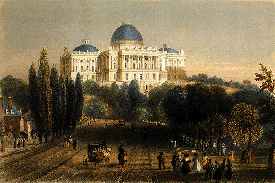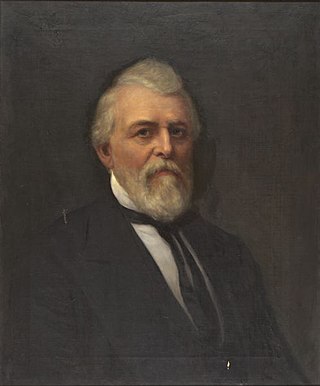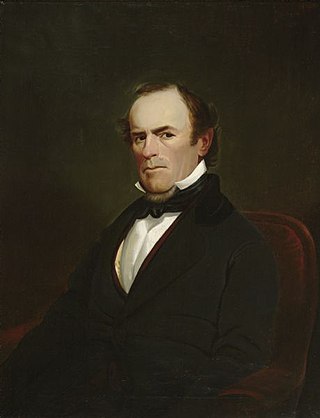
The 25th United States Congress was a meeting of the legislative branch of the United States federal government, consisting of the United States Senate and the United States House of Representatives. It met in Washington, D.C. from March 4, 1837, to March 4, 1839, during the first two years of Martin Van Buren's presidency.

George Wallace Jones was an American frontiersman, entrepreneur, attorney, and judge, was among the first two United States Senators to represent the state of Iowa after it was admitted to the Union in 1846. A Democrat who was elected before the birth of the Republican Party, Jones served over ten years in the Senate, from December 7, 1848 to March 3, 1859. During the American Civil War, he was arrested by Federal authorities and briefly jailed on suspicion of having pro-Confederate sympathies.

The Territory of Iowa was an organized incorporated territory of the United States that existed from July 4, 1838, until December 28, 1846, when the southeastern portion of the territory was admitted to the Union as the state of Iowa. The remainder of the territory would have no organized territorial government until the Minnesota Territory was organized on March 3, 1849.

The Territory of Wisconsin was an organized and incorporated territory of the United States that existed from July 3, 1836, until May 29, 1848, when an eastern portion of the territory was admitted to the Union as the State of Wisconsin. Belmont was initially chosen as the capital of the territory. In 1837, the territorial legislature met in Burlington, just north of the Skunk River on the Mississippi, which became part of the Iowa Territory in 1838. In that year, 1838, the territorial capital of Wisconsin was moved to Madison.

Moses Henry Dodge was an American politician and military officer who was Democratic member to the U.S. House of Representatives and U.S. Senate, Territorial Governor of Wisconsin and a veteran of the Black Hawk War. His son, Augustus C. Dodge, served as a U.S. Senator from Iowa; the two were the first and so far the only father-son pair to serve concurrently in the Senate, which they did from 1848 to 1855.
The 15th Parliament of Lower Canada was in session from March 21, 1835, to March 27, 1838. Elections to the Legislative Assembly in Lower Canada had been held in October 1834. The lower house was dissolved following the Lower Canada Rebellion and Lower Canada was administered by an appointed Special Council until the Act of Union in 1840 established a new lower chamber for the Province of Canada. All sessions were held at Quebec City.

Moses McCure Strong was an American lawyer, politician, businessman, and Wisconsin pioneer. He was one of the framers of the Constitution of Wisconsin, a member of the territorial legislature, and United States Attorney for the Wisconsin Territory under President Martin Van Buren. After Wisconsin achieved statehood, he was Speaker of the Wisconsin State Assembly during the 3rd Wisconsin Legislature.

The Ninety-Ninth Wisconsin Legislature convened from January 5, 2009, through January 3, 2011, in regular session, though it adjourned for legislative activity on May 26, 2010. The legislature also held two special sessions and four extraordinary sessions during this legislative term.

William Rudolph Smith was an American lawyer, politician, pioneer, and historian from Pennsylvania who served as the 5th Attorney General of Wisconsin, the first President of the Wisconsin Historical Society, and the first Adjutant General of Wisconsin.

Levi Sterling was an American farmer, politician, and Wisconsin pioneer. He was one of the first American settlers at what is now Iowa County, Wisconsin. He served five years in the Wisconsin Legislature and—before Wisconsin achieved statehood—he served three years in the Wisconsin Territorial Assembly. During the American Civil War, he served as a Union Army cavalry officer.
Peter Hill Engle was an American lawyer, judge, and Iowa pioneer. He served as the first Speaker of the Legislative Assembly of the Wisconsin Territory after it was established, when it still contained the territory of the future states of Iowa and Minnesota. He later served as a judge of the St. Louis County, Missouri, Court of Common Pleas from 1841 until his death.
The Minnesota Territorial Legislature was a bicameral legislative body created by the United States Congress in 1849 as the legislative branch of the government of the Territory of Minnesota. The upper chamber, the Council, and the lower chamber, the House of Representatives, first convened on September 3, 1849. The two chambers served as the territory's legislative body until Minnesota was admitted as a state on May 11, 1858, when the Territorial Legislature was replaced by the Minnesota Legislature.
William Billings Sheldon was an American lawyer and Wisconsin pioneer. He was an early settler of Janesville, Wisconsin, and served in the Legislature of the Wisconsin Territory. He was Speaker of the Assembly during the Special Session of the 1st Legislature.
David Newland was an American politician in North Carolina and Wisconsin. He was Speaker of the 3rd Legislative Assembly of the Wisconsin Territory. Earlier in his life he served as a member of the North Carolina Senate and House of Commons, and was involved in a disputed 1835 congressional election in North Carolina against James Graham.

Redistricting in Wisconsin is the process by which boundaries are redrawn for municipal wards, Wisconsin State Assembly districts, Wisconsin State Senate districts, and Wisconsin's congressional districts. Redistricting typically occurs—as in other U.S. states—once every decade, usually in the year after the decennial United States census. According to the Wisconsin Constitution, redistricting in Wisconsin follows the regular legislative process, it must be passed by both houses of the Wisconsin Legislature and signed by the Governor of Wisconsin—unless the Legislature has sufficient votes to override a gubernatorial veto. Due to political gridlock, however, it has become common for Wisconsin redistricting to be conducted by courts. The 1982, 1992, and 2002 legislative maps were each enacted by panels of United States federal judges; the 1964 and 2022 maps were enacted by the Wisconsin Supreme Court.
The Second Legislative Assembly of the Wisconsin Territory convened from November 26, 1838, to December 22, 1838, from January 21, 1839, to March 11, 1839, and from December 2, 1839, to January 13, 1840, in regular session. The Assembly also convened in an extra session from August 3, 1840, to August 14, 1840.
The Third Legislative Assembly of the Wisconsin Territory convened from December 7, 1840, to February 19, 1841, and from December 6, 1841, to February 19, 1842, in regular session.
The Fourth Legislative Assembly of the Wisconsin Territory convened from December 5, 1842, to April 17, 1843, from December 4, 1843, to January 31, 1844, from January 6, 1845, to February 24, 1845, and from January 5, 1846, to February 3, 1846, in regular session.

The Fifth Legislative Assembly of the Wisconsin Territory convened from January 4, 1847, to February 11, 1847, and from February 7, 1848, to March 13, 1848, in regular session. The Assembly also convened in special session from October 18, 1847, to October 27, 1847, to organize a second constitutional convention after the failure to adopt the first Wisconsin Constitution.
William Shew was a farmer and businessman from Oak Creek, Wisconsin and Cordova, Illinois who served multiple terms in the Wisconsin Territory House of Representatives representing Milwaukee County, and was Speaker of the House of that body during the first (1847) session of the 5th Wisconsin Territorial Assembly, as well as holding various local government posts.










